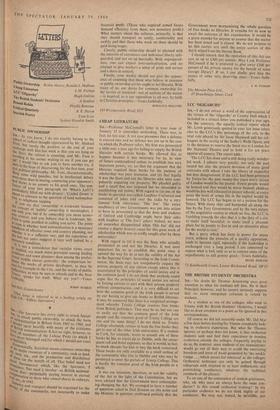S1R,—Professor McConnell's letter in your issue of January 15 is
somewhat misleading. There was, in fact, no test case. A test case presumes that a defence is entered into and no defence was put up in the case to which the Professor refers. My firm was prosecuted a little over a year ago for failing to supply the British libraries with certain books. We allowed this to happen because it was necessary for us, in view of future contemplated action, to establish two very important points, viz. (a) that the argument that the libraries required these books for the purpose of scholarship was pure nonsense, and (b) that legally it was the State and not the libraries who were com- pulsorily acquiring our property. We pleaded guilty and a small fine was imposed but we succeeded in establishing our points. With regard to (a) one of the books in question was called Laughter Unlimited and consisted of jokes told over the radio by a very famous Irish entertainer, 'Din Joe.' The entire machinery of two Governments was put into action to have us prosecuted so that the dons and students of Oxford and Cambridge might burst their sides with laughter at 'Din Joe's jokes! Indeed, we were all somewhat disappointed when 'Din Joc' did not receive a degree honoris causa for this great work of scholarship which was so avidly sought after by these universities!
With regard to (b) it was the State who actually prosecuted us and not the libraries. It was most important for us to establish this point since it opened the way for us to test the validity of the Act in the Supreme Court. According to the Irish Consti- tution, the State may not compulsorily acquire the private property of any citizen except where this is necessitated by the principles of social justice and in the common good. I do not think that anybody could argue that the principles of social justice are served by forcing citizens to part with their private property without compensation, and it is very difficult to see how the common good of the Irish people is served by our having to give our books to British libraries. It may be answered that there is a reciprocal arrange- ment whereby Trinity College receives free books from British publishers. That may be so, but can one so easily say that the common good of the Irish people and the common good of Trinity College are one and the same thing? I do not think so. Trinity College absolutely refuses to loan the free books they get to any of the other Irish universities. If a student in Cork, for example, wants to consult one of these 'books he has to travel up to Dublin, with the conse- quent rail and hotel expenses, so that it would, in fact, be much cheaper for him to buy the book concerned. These books arc only available to a small section of the community who live in Dublin and who may be permitted to enter the portals of Trinity College. This is hardly the common good of the Irish people as a whole.
It was our intention, therefore, to test the validity of the Act in the light of the Constitution, but we were advised that the Government were contemplat- ing changing the Act. We arranged to have a number of questions asked in Dail Eireann on this point and the Minister in question confirmed publicly that the Government were re-examining the whole question of free books to libraries. It remains for us now to await the outcome of this examination. It would be a grave mistake for anyone to assume that the matter has been tested and is closed. We do not propose to let this matter rest until the entire section of this Act is wiped from the Statute Book.
I should remark that the operation of this Act can cost us up to £300 per annum. May I ask Professor McConnell if he is prepared to give away £300 per annum of his private money for the benefit of some foreign library? If so, I can gladly give him the names of some very deserving ones.—Yours faith- fully, The Mercier Press Ltd., 17 Drawbridge Street, Cork






































 Previous page
Previous page